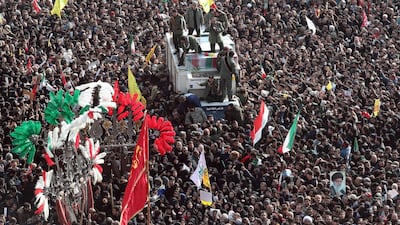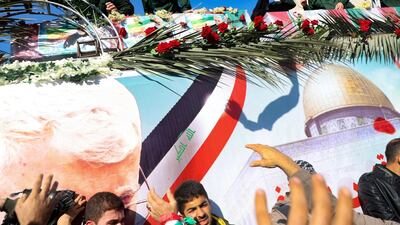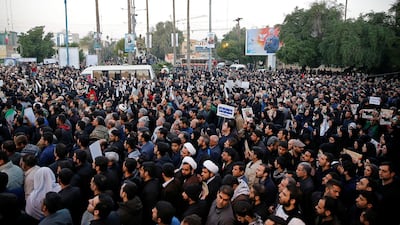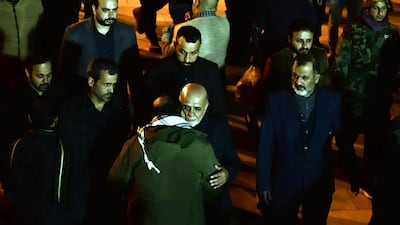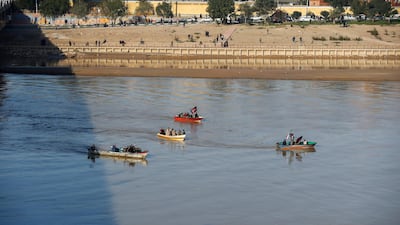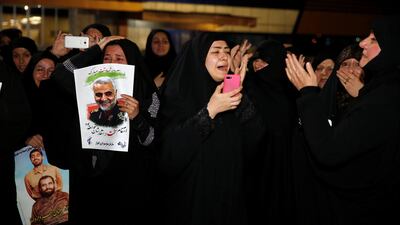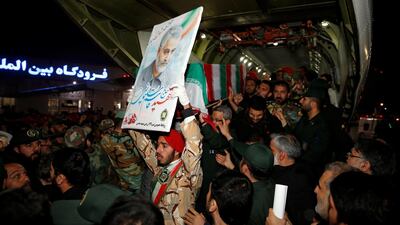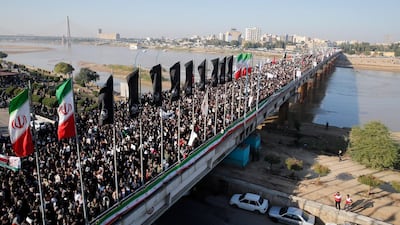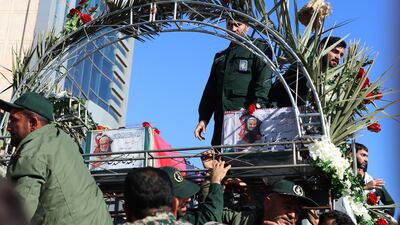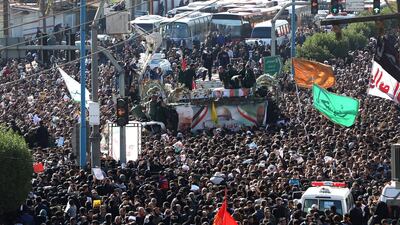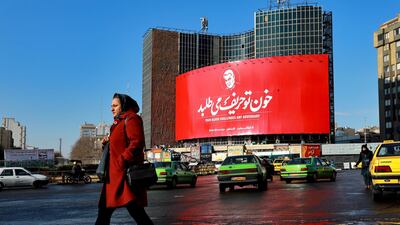The speaker of Iraq's House of Representatives warned that the country could face financial repercussions over parliament's plan to expel foreign troops from the country, as US President Donald Trump threatens "massive sanctions" if they do.
On Sunday, Iraq's parliament voted on a five-point action plan that would require the Iraqi government to end the presence of foreign troops in the country, and withdraw its request for assistance from the anti-ISIS global coalition.
It also called on the government to ban the use of Iraqi airspace by any foreign power.
In a video that circulated online on Monday, speaker Mohamed Al Halbousi urged restraint in the implementation of the vote due to the potential implications for the country.
"One of the measures the international community may take could be to halt all their financial dealings with Iraq and we will not be able to fulfil our financial obligations towards the public at any given moment," he said.
On Sunday, Mr Trump said he would impose "very big sanctions" on Iraq if it follows through on a the vote amid anger over the death of Gen Qassem Suleimani, the head of Iran's elite forces who was killed in a US drone strike near Baghdad's international airport on Friday.
Iran also said it planned to further roll back its commitments to the 2015 nuclear deal it signed with global powers, but claimed it intended to continue to co-operate with the UN nuclear watchdog, the IAEA.
State television cited a government statement as saying Iran would not respect any limits set out in the pact, known as the Joint Comprehensive Plan of Action, on the number of uranium enrichment centrifuges it could use.
This would mean there would be no limit on Iran’s enrichment capacity, the level to which uranium could be enriched, or its nuclear research and development. These limits would now be based on Iran's technical needs.
Mr Trump repeated his insistence that the country will not be allowed to obtain a nuclear weapon, writing in all-caps on Twitter: "IRAN WILL NEVER HAVE A NUCLEAR WEAPON!"
The leaders of the UK, France and Germany have condemned recent rocket attacks on coalition forces in Iraq and called for a de-escalation in the region.
French President Emmanuel Macron, German Chancellor Angela Merkel and UK Prime Minister Boris Johnson said in a joint statement: "We specifically call on Iran to refrain from further violent action or proliferation and urge Iran to reverse all measures inconsistent with the JCPOA."
It came as thousands lined the streets of Tehran on Monday for further funeral processions fro Suleimani. Ayatollah Ali Khamenei, Iran's typically reserved and measured supreme leader, cried openly during a mass prayer as he stood over a flag-draped casket.
Police said attendees to the procession numbered into the millions, although that has not been verified.
Suleimani’s daughter, Zeinab, threatened the US when speaking to the crowd, saying: “The families of the American soldiers in western Asia … will spend their days waiting for the death of their children."
The US killed Suleimani and other members of Iran's elite Islamic Revolutionary Guard Quds Force, as well as a senior Iraqi militia leader, in an attack on their convoy at Baghdad’s international airport. Ordered by Mr Trump, the deaths have increased the chances of a war between the two nations as senior Iranian figures have vowed to strike US military targets in response.
To many across the Middle East, Suleimani was a dangerous figure whose armed militias killed thousands of Sunni Muslims in Syria and threatened regional security. To the US, he was the man responsible for the deaths of American soldiers in Iraq and the countless attacks on Iraqis fighting alongside them.
He was a powerful commander in charge of the Quds Force, overseeing Iran’s proxy militias abroad, ranging from Hezbollah in Lebanon to armed factions in Iraq, Syria and Yemen. In Iraq, that meant directing the country’s mostly Shiite paramilitaries, including in the fight alongside the US against Sunni extremists like ISIS.
Unlike other military commanders of the force, the 62-year-old general answered only to the 80-year-old Mr Khamenei.
Three days of mourning was declared in Iran and Mr Khamenei vowed “harsh retaliation”.
The new chief of Iran’s Quds Force, Esmail Qaani, also threatened to take revenge on the US, saying "certainly actions will be taken" on Iranian TV on Monday.
In the US, however, two top Senate Democrats called on Mr Trump to immediately declassify the administration’s reasoning for the strike on Suleimani, saying there is “no legitimate justification” for keeping the information from the public.
Congress, which has the sole power to declare war, has complained that Mr Trump did not provide 48-hour advance notice of the strike.
Mr Trump has vowed to target 52 Iranian cultural sights if the US is targeted by them as tension escalates, mirroring the number of US embassy hostages held for 444 days after the Iranian revolution, saying he did not believe it was fair that such targets were off limits.
“They’re allowed to kill our people. They’re allowed to torture and maim our people. They’re allowed to use roadside bombs and blow up our people. And we’re not allowed to touch their cultural sites? It doesn’t work that way," he said.
UK Prime Minister Johnson asked Mr Trump to step back from a threat to target Iranian cultural sites in strikes, saying the destruction of the sites was prohibited under the terms of The Hague Convention, of which the US was a signatory.
